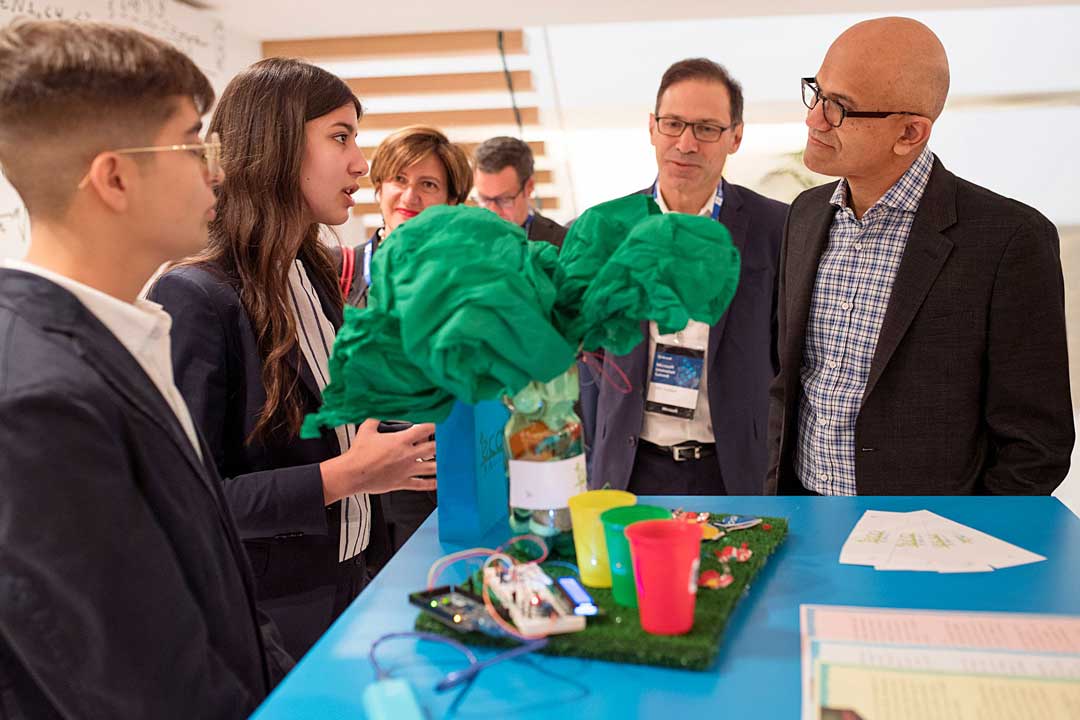The COVID-19 crisis brought huge danger that meant the online environment was suddenly safer than the physical world.
Despite the extremely difficult circumstances, lockdowns presented an opportunity for people to gain new digital skills to become better equipped to find work in a post-pandemic world.
This is especially important for minority groups, with research suggesting that the pandemic has widened existing inequalities: women, the poor, elderly, disabled and migrant populations have borne the brunt of the economic fallout from the pandemic.
Europe’s challenge
One in every three people who work in Europe lack basic digital skills, according to the European Commission’s Digital Economy and Society Index (DESI).
The Commission plans to equip at least 80% of adult European citizens with basic digital skills by 2030, employ 20 million IT specialists in the EU, and encourage more women to work in tech. To do so, it has developed initiatives such as the European Skills Agenda and the Digital Education Action Plan.
Companies are also lending their support, with Microsoft, LinkedIn, and GitHub combining existing and new resources to launch a global skills initiative in June 2020 to help people gain the skills needed in the increasingly digital world of work.
The global skills initiative in action throughout Europe
A year since its launch, the program has reached more than 40 million people worldwide, and almost 9 million people in Europe, of which over 6 million were in the EU.
Here are three examples of the global skills initiative underway in Europe, where Microsoft is working alongside nonprofits with a specific aim to make sure the economic recovery is as inclusive as possible.
Romania
In the global, digital economy, it is vital that no person and no country is left behind. Romania currently ranks 26th out of the 28 countries included in the Commission’s Digital Economy and Society Index (DESI) in 2020. Less than one third of Romanians aged between 16 and 74 have basic digital skills, while only 35% have basic software skills.
When the COVID-19 pandemic hit, it was critical to support teachers and schools in developing the skills and methods needed to teach online, as well as to build partnerships with the private and public sectors to help those most affected by the pandemic in terms of economic, social, and emotional well-being.
For the nonprofit organization Educating for an Open Society (EOS), it was only natural to step in. On top of the above activities, it has partnered with Microsoft and five universities to implement the Cloud Employability Accelerator Program – an innovative training and certification initiative aimed at supporting young people looking to acquire cloud technology skills, and access jobs in the IT sector. To date, 1,644 students have participated in the program.
 This includes Diana Carjan, who was a final-year student at the Lucian Blaga University of Sibiu in 2020.
This includes Diana Carjan, who was a final-year student at the Lucian Blaga University of Sibiu in 2020.
“I wanted a place in this program since I wasn’t sure what my next step would be once I graduated – all I knew was that I had to seriously think about where to go next,” she says. “I chose to focus on learning about Microsoft Power Platform and really developed my understanding and skills around Power Automate. Step by step I was moving through learning how to improve productivity by automating business processes and analyzing data to produce business insights. I loved learning about chatbots and model-driven apps.”
As well as Power Platform, the program also takes students through training and certification on Azure Cloud, Office 365, and Dynamics. All content is available online, free of charge, and is linked to the Microsoft Learn platform.
After passing her Microsoft Fundamentals certification, Diana now works as junior software engineer. “Perhaps one of the big messages I take away from the experience with the Cloud Employability Accelerator program is the fact that learning never stops,” she concludes. “The pace of change in the tech sector is huge and we need to continue to stay updated and continuously keep pace with developments.”
Greece
Youth unemployment rates in Greece are among the highest in Europe.
ReGeneration is one organization hoping to change that, by partnering directly with employers and academic institutions to provide more opportunities for young graduates, bridge the skills gap, and better equip Greece’s young people for the digital workplace. Its mission is to empower the next generation of young professionals, regardless of background, gender, disability, or social class.

Its partnership with Microsoft began in 2020, through learning academies in topics including Cloud Tools and Technology as well as Big Data and Artificial Intelligence, and a program designed to provide young women with hands-on training in tech-related project management.
“The program gave me the opportunity to acquire new skills in the field of technology, to improve my knowledge in programming, to get to know the world of web development and the cloud, as well as to work with people who have the same passion and energy to experiment with new technologies,” says Konstantinos Rotas, one of the Graduates from the Cloud Tools and Technology Academy.

Another participant, Agapi Davradou, claims the program was a real boost to her career: “From the very first week I had many offers, and I found a job within a month. I am currently working as a software engineer,” she explains.
Later this year, ReGeneration will launch a new reskilling program: “The ReGeneration Initiative: Upskilling Greek Youth for the Digital Era powered by Microsoft”. It aims to help 1,000 young people across Greece by providing approximately 20,000 hours of training in soft and digital skills, followed by placements in the job market.
Italy

In Italy, Microsoft partnered with Fondazione Mondo Digitale (FMD), a nonprofit with experience in innovative educational and digital skills training. The organization has a particular focus on the people who are at the greatest risk of being excluded, such as older workers, immigrants and unemployed young people.
Through the foundation’s national network of schools, it has offered digital skills to thousands of students, particularly in Italian cities with high unemployment rates, such as Rome, Palermo and Bari. Programs offered by FMD not only help with developing digital skills, they also help young people to make decisions about their future career.
Francesca Maria Pia Nicoletti, an 18-year-old student from Cosenza, has always been intrigued by technology and computers. Realizing the job opportunities that technology can open for young people, she decided to follow extra courses recommended by FDM on LinkedIn Learning.
Francesca explained that she decided to take part in the project “because I believe that nowadays technology surrounds us in every area, and it is important to know it in all its facets”. She is confident that what she has learned will help her achieve all her goals and has already decided which university to attend and where she would like to work.
 At the other end of his career, Giulio Carra, 67, spent time working in the jewelry business, but never gave up on his passion for journalism. After moving to Rome, he found himself unemployed. Thanks to a recommendation he learned about FDM and their digital skills training courses.
At the other end of his career, Giulio Carra, 67, spent time working in the jewelry business, but never gave up on his passion for journalism. After moving to Rome, he found himself unemployed. Thanks to a recommendation he learned about FDM and their digital skills training courses.
Training in using the internet and social networks has helped him keep up with the evolving world of journalism to avoid being left behind. “The most important thing I’ve learned is to never get complacent,” he says. “Everyone can develop beyond their experiences, because we are always evolving.”
